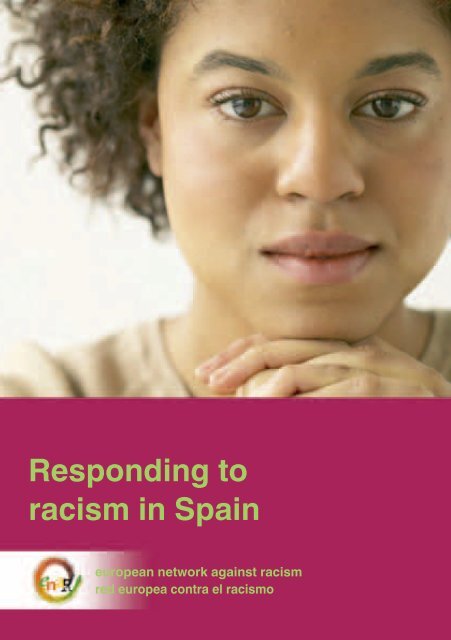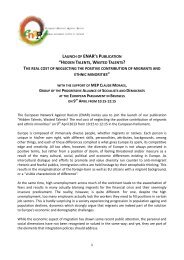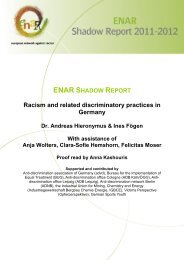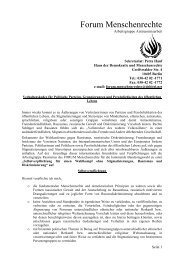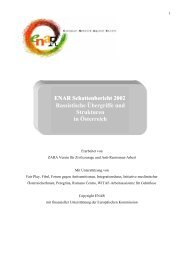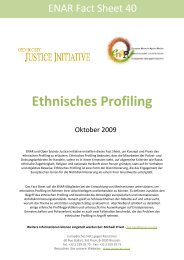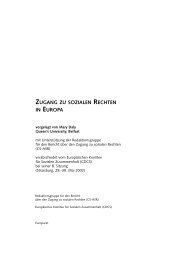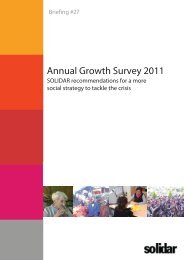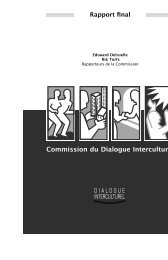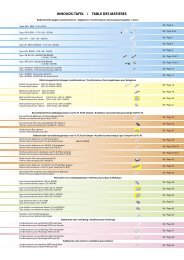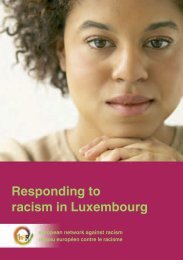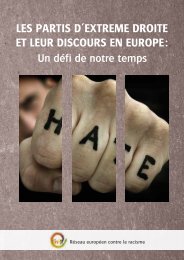Responding to racism in Spain - Horus
Responding to racism in Spain - Horus
Responding to racism in Spain - Horus
You also want an ePaper? Increase the reach of your titles
YUMPU automatically turns print PDFs into web optimized ePapers that Google loves.
<strong>Respond<strong>in</strong>g</strong> <strong>to</strong><br />
<strong>racism</strong> <strong>in</strong> Spa<strong>in</strong><br />
european network aga<strong>in</strong>st <strong>racism</strong><br />
red europea contra el <strong>racism</strong>o
OvERviEw Of RAciSm<br />
iN thE NAtiONAl cONtExt<br />
Spanish citizens’ perception of foreigners is becom<strong>in</strong>g negative<br />
due <strong>to</strong> different fac<strong>to</strong>rs, one of them be<strong>in</strong>g how the media deals<br />
with the issue. Over the past few years, cont<strong>in</strong>uous changes <strong>to</strong><br />
migration-related laws have been <strong>in</strong>creas<strong>in</strong>gly discrim<strong>in</strong>a<strong>to</strong>ry and<br />
have promoted a bad image of foreigners. They also have am-<br />
plified the social exclusion problem of many of them. Ensur<strong>in</strong>g<br />
equality for all, regardless of their orig<strong>in</strong>, is becom<strong>in</strong>g <strong>in</strong>creas<strong>in</strong>gly<br />
difficult and the number of everyday situations <strong>in</strong> which foreigners<br />
face discrim<strong>in</strong>ation (<strong>in</strong> f<strong>in</strong>d<strong>in</strong>g a place <strong>to</strong> live, for example) is ris-<br />
<strong>in</strong>g. Foreigners now make up more than 10 % of the population <strong>in</strong><br />
many parts of Spa<strong>in</strong>, whereas they only represented 2% of it less<br />
than five years ago. Although their presence is now a fact, they are<br />
persistently denied the recognition of their rights, <strong>in</strong>clud<strong>in</strong>g some<br />
as important as their political rights.<br />
We also have <strong>to</strong> keep <strong>in</strong> m<strong>in</strong>d that Spa<strong>in</strong> is an entry gate <strong>to</strong> Eu-<br />
rope for people com<strong>in</strong>g from the southern part of the world, as it<br />
shares borders with Africa. At these borders our African neighbour<br />
countries are violat<strong>in</strong>g human rights with Spanish and European<br />
money, while we rema<strong>in</strong> unconcerned about the rights of the Af-<br />
rican population. Moroccan citizens’ situation is similar; they die<br />
on a daily basis by drown<strong>in</strong>g <strong>in</strong> the sea because they had the bad<br />
luck of be<strong>in</strong>g born 12 kilometres away from the much dreamed-of<br />
Europe.<br />
Racism aga<strong>in</strong>st the Gypsy community still persists <strong>to</strong>day although<br />
Roma people have lived <strong>in</strong> our cities s<strong>in</strong>ce they settled hundreds<br />
of years ago. Discrim<strong>in</strong>ation has come <strong>to</strong> be accepted by many of<br />
them so that they no longer speak out, which makes putt<strong>in</strong>g an end<br />
<strong>to</strong> this k<strong>in</strong>d of situations even harder. As well as Spanish Gypsies,<br />
foreign Gypsies are arriv<strong>in</strong>g who suffer a double discrim<strong>in</strong>ation,<br />
both as Roma and as foreigners.<br />
.
OvERviEw ANd kEy<br />
ActivitiES Of thE SpANiSh<br />
NAtiONAl cOORdiNAtiON<br />
ENAR’s activities <strong>in</strong> Spa<strong>in</strong> have been somewhat<br />
paralysed dur<strong>in</strong>g these last years. Social organi-<br />
sations have little resources at their disposal for<br />
activities. Most of their staff is made up of vol-<br />
unteers who choose <strong>to</strong> focus on their daily work<br />
with<strong>in</strong> the association and are unable <strong>to</strong> work for<br />
the Network. The ones <strong>to</strong> suffer from this problem<br />
the most are immigrant associations recently es-<br />
tablished <strong>in</strong> Spa<strong>in</strong> that do not have time for social<br />
militancy.<br />
However, the Network’s structure has undergone<br />
changes at the end of 2005, and volunteers have<br />
been assigned <strong>to</strong> work for ENAR. In this way we<br />
hope <strong>to</strong> give a good thrust <strong>to</strong> the fight aga<strong>in</strong>st rac-<br />
ism at this important social and political moment.<br />
Our work dur<strong>in</strong>g this past year has precisely been<br />
<strong>to</strong> press the authorities <strong>to</strong> act <strong>in</strong> view of the situ-<br />
ation. That is why we have been campaign<strong>in</strong>g<br />
with Amnesty International among politicians and<br />
authorities for a State plan aga<strong>in</strong>st <strong>racism</strong> <strong>to</strong> deal<br />
with this new reality.<br />
OvERviEw Of ENAR<br />
– EuropEan nEtwork<br />
AgAiNSt RAciSm<br />
ENAR promotes the cause of anti-<strong>racism</strong> and<br />
equal treatment for ethnic m<strong>in</strong>orities and non-EU<br />
nationals resid<strong>in</strong>g <strong>in</strong> the European Union.<br />
ENAR is a network of European NGOs work-<br />
<strong>in</strong>g <strong>to</strong> combat <strong>racism</strong> <strong>in</strong> all EU Member States.<br />
The NGOs have formed National Coord<strong>in</strong>a-<br />
tions (NCs), which constitute the membership of<br />
ENAR and <strong>in</strong>clude ethnic m<strong>in</strong>orities, immigrants’<br />
associations, <strong>in</strong>formation centres, advocacy<br />
groups, trade unions, faith based organisations<br />
and many others. Democratically elected rep-<br />
resentatives of each NC attend the Network’s<br />
meet<strong>in</strong>gs where they are consulted on policy and<br />
statu<strong>to</strong>ry issues. One of the representatives of<br />
each NC should belong <strong>to</strong> an ethnic m<strong>in</strong>ority.<br />
ENAR is determ<strong>in</strong>ed <strong>to</strong> fight <strong>racism</strong>, xenopho-<br />
bia, anti-Semitism and Islamophobia, <strong>to</strong> promote<br />
equality of treatment between EU citizens and<br />
third country nationals, and <strong>to</strong> l<strong>in</strong>k local/regional/<br />
national <strong>in</strong>itiatives with European <strong>in</strong>itiatives.
whO iS ExpERiENciNg RAciSm:<br />
thE situation <strong>in</strong> spa<strong>in</strong><br />
The ma<strong>in</strong> victims of <strong>racism</strong> <strong>in</strong> Spa<strong>in</strong> are Gypsies and foreigners. Gyp-<br />
sies have been suffer<strong>in</strong>g this situation for 500 years now. Stereotypes<br />
about them, their nomad life, their <strong>in</strong>ability <strong>to</strong> <strong>in</strong>tegrate, etc., are deeply<br />
rooted <strong>in</strong> our society. For many years they have been discrim<strong>in</strong>ated<br />
aga<strong>in</strong>st <strong>in</strong> a similar way as foreigners are nowadays. For a Roma it is<br />
much harder <strong>to</strong> f<strong>in</strong>d a decent place <strong>to</strong> live than it is for any other citizen.<br />
School failure is also much more widespread among Gypsy children.<br />
When surveys are conducted <strong>in</strong> schools and on the streets about what<br />
group is the most rejected by society, Gypsies unfortunately are always<br />
first on the list.<br />
Today many of the foreigners who come <strong>to</strong> work and live <strong>in</strong> Spa<strong>in</strong> are<br />
discrim<strong>in</strong>ated aga<strong>in</strong>st <strong>in</strong> many fields, above all legally. S<strong>in</strong>ce 2001 the<br />
Immigration Law has been modified three times; each time more dis-<br />
crim<strong>in</strong>a<strong>to</strong>ry regulations have been <strong>in</strong>cluded. For example, dur<strong>in</strong>g the<br />
last legal reform <strong>in</strong> December 2003, it was established that foreigners’<br />
registration <strong>in</strong> <strong>to</strong>wn halls expires after a two-year period and that they<br />
do not enjoy the same rights as a Spanish citizen when go<strong>in</strong>g <strong>to</strong> a public<br />
adm<strong>in</strong>istration office.<br />
The way the media treats this issue is terrible. When an <strong>in</strong>cident hap-<br />
pens, if the person who has caused it is a foreigner, the media always<br />
report that person’s nationality, thereby stigmatis<strong>in</strong>g their whole com-<br />
munity. This has created a negative feel<strong>in</strong>g <strong>to</strong>wards foreigners among<br />
Spaniards. The latest surveys have shown that the majority of Span-<br />
iards consider the arrival of foreigners a necessity but that more than<br />
50% of them consider immigration a problem. The people who suffer<br />
from this the most are the s<strong>in</strong> papeles, people <strong>in</strong> an irregular legal situ-<br />
ation, who have now reached the amount of 600,000.
pOliticAl REAlity:<br />
NAtiONAl lAwS AgAiNSt RAciSm<br />
In view of this situation the public authorities keep silent and deny<br />
the existence of discrim<strong>in</strong>ation when it is made public. Most of them<br />
turn a bl<strong>in</strong>d eye <strong>to</strong> the situation. This <strong>in</strong>creases the concern of so-<br />
cial organisations and aggravates the manifestations of <strong>racism</strong> <strong>in</strong><br />
our society. In March 2004 an important political change <strong>to</strong>ok place<br />
that affected this reality. Unlike the previous rul<strong>in</strong>g party, the current<br />
one doesn’t use the rejection of immigration as a political weapon.<br />
However, immigration laws are essentially the same. Immigration<br />
is still considered a public issue and little is done <strong>to</strong> achieve social<br />
<strong>in</strong>clusion.<br />
On the southern border, for example, the Spanish authorities are<br />
mak<strong>in</strong>g full use of their good relations with the Moroccan Govern-<br />
ment <strong>to</strong> slow down African immigration <strong>in</strong> exchange for money,<br />
while they disregard these people’s human rights. A special regula-<br />
tion process was carried out, but it was <strong>in</strong>sufficient and politically<br />
<strong>in</strong>fluenced. This caused many people <strong>to</strong> be turned down and kept<br />
<strong>in</strong> an irregular situation, because their application depended on their<br />
employers.<br />
The current socialist government shows a degree of cowardice <strong>in</strong><br />
immigration-related matters that it does not show <strong>in</strong> other fields. This<br />
is reflected <strong>in</strong> the weakness of its fight aga<strong>in</strong>st <strong>racism</strong>. S<strong>in</strong>ce com<strong>in</strong>g<br />
<strong>to</strong> power it hasn’t developed any specific legislation. In December<br />
2003, the law concern<strong>in</strong>g the transposition of European directives<br />
43/00 and 78/00 was passed, known as Law 62/2003, as was the<br />
law concern<strong>in</strong>g the proposed national budgets where both direc-<br />
tives were <strong>in</strong>serted. S<strong>in</strong>ce then, neither the previous government nor<br />
the present one have done anyth<strong>in</strong>g <strong>to</strong> develop them. Many prom-<br />
ises were made, but <strong>to</strong> this day we are lack<strong>in</strong>g bodies specialised <strong>in</strong><br />
combat<strong>in</strong>g <strong>racism</strong>, and important measures need <strong>to</strong> be taken.
impORtANcE Of thE civil<br />
sociEty <strong>in</strong>frastructurE<br />
Part of civil society has organised itself <strong>to</strong> combat <strong>racism</strong> and xeno-<br />
phobia. It is not as big <strong>in</strong> number as <strong>in</strong> other countries, but it makes<br />
up an important structure. However, most organisations, especially<br />
the important ones, receive most of their fund<strong>in</strong>g from the public<br />
authorities and are not <strong>in</strong>dependent enough <strong>to</strong> be able <strong>to</strong> criticise,<br />
especially when one of the biggest agents of discrim<strong>in</strong>ation is the<br />
public adm<strong>in</strong>istration itself.<br />
Another problem <strong>in</strong> the fight aga<strong>in</strong>st <strong>racism</strong> <strong>in</strong> Spa<strong>in</strong> is that few or-<br />
ganisations take it <strong>in</strong><strong>to</strong> account <strong>in</strong> their daily work. Over the last few<br />
years the immigrant population has multiplied. Many organisations<br />
have sprung <strong>to</strong> life <strong>to</strong> address these people’s need for social and<br />
legal assistance, but they have concentrated on manag<strong>in</strong>g docu-<br />
mentation and services, not on gather<strong>in</strong>g data on discrim<strong>in</strong>ation.<br />
Their mostly heavy workload is focused on daily goals. They don’t<br />
systematise the <strong>in</strong>formation they obta<strong>in</strong> because, s<strong>in</strong>ce Spa<strong>in</strong> is<br />
one of Europe’s southern frontiers, dramatic scenes take place on<br />
its borders that make the organised collection of data, which cold<br />
be helpful <strong>in</strong> the fight aga<strong>in</strong>st <strong>racism</strong>, difficult.<br />
Gypsy people are organised <strong>in</strong> large associations but these, with<br />
a few exceptions, do not work <strong>to</strong> combat <strong>racism</strong> either. Foreign-<br />
ers’ organisations are more numerous everyday but, be<strong>in</strong>g first<br />
generation migrants, they have little resources at their disposal.<br />
Those with resources aim for more cultural objectives and those<br />
who act aga<strong>in</strong>st <strong>racism</strong> don’t have time for big activities due <strong>to</strong> their<br />
economic and social situation. We hope that this landscape will<br />
change for the better <strong>in</strong> the future, and that second generation mi-<br />
grants will be more established and will take part <strong>in</strong> activities such<br />
as the II World Forum on Migrations <strong>to</strong> be held <strong>in</strong> Madrid <strong>in</strong> June<br />
2006.
StRAtEgic lEgiSlAtiON<br />
Many anti-racist NGOs have not traditionally engaged <strong>in</strong> legal<br />
processes, often this is for the simple reason that there was little law<br />
for them <strong>to</strong> refer <strong>to</strong>. However the adoption of the EU Race Directive<br />
(see section ‘EU and anti-<strong>racism</strong>’) and the development of national<br />
law, means that now more than ever litigation has the potential <strong>to</strong><br />
lead <strong>to</strong> real change for those who are vulnerable <strong>to</strong> <strong>racism</strong> and<br />
discrim<strong>in</strong>ation.<br />
As anti-discrim<strong>in</strong>ation is a relatively new field of law, NGOs have a<br />
role <strong>to</strong> play <strong>in</strong> rais<strong>in</strong>g awareness regard<strong>in</strong>g its potential. Consequently<br />
the strategic litigation has come <strong>to</strong> the fore as a useful advocacy<br />
technique. NGOs can both directly engage <strong>in</strong> strategic litigation and<br />
support others <strong>to</strong> do so by gather<strong>in</strong>g data, assess<strong>in</strong>g victims and<br />
engag<strong>in</strong>g <strong>in</strong> advocacy.<br />
“Strategic or impact litigation uses the court system <strong>to</strong> attempt <strong>to</strong><br />
create broad social change”<br />
The primary focus of strategic litigation is law or policy change rather<br />
than redress for an <strong>in</strong>dividual, though these two objectives are not<br />
mutually exclusive. Strategic litigation <strong>in</strong>tends <strong>to</strong> reach beyond an<br />
<strong>in</strong>dividual case or victim, <strong>to</strong> create a context of enhanced protection<br />
for everyone who is vulnerable <strong>to</strong> discrim<strong>in</strong>ation. By chang<strong>in</strong>g law or<br />
sett<strong>in</strong>g precedents an <strong>in</strong>dividual case can have a ripple effect lead<strong>in</strong>g<br />
<strong>to</strong> change on a much broader level.<br />
The concept of strategic litigation encompasses the selection of cases,<br />
case plann<strong>in</strong>g and management, as well as ensur<strong>in</strong>g that favourable<br />
outcomes are implemented.<br />
Not every NGO has the mandate or skills <strong>to</strong> engage <strong>in</strong> litigation,<br />
nor will litigation necessarily be the right strategy <strong>in</strong> many cases.<br />
Nonetheless, it is essential for all anti-<strong>racism</strong> ac<strong>to</strong>rs <strong>to</strong> recognise the<br />
importance of strategic litigation as a <strong>to</strong>ol for generat<strong>in</strong>g change.
SERvicES AvAilAblE fOR thE<br />
victimS Of RAciAl diScRimiNAtiON<br />
Gypsy people have associations <strong>in</strong> most Spanish cities that aim <strong>to</strong> unite<br />
them but that do not usually address discrim<strong>in</strong>ation situations. In those<br />
cases they contact local anti-<strong>racism</strong> or human rights organisations <strong>to</strong> ob-<br />
ta<strong>in</strong> <strong>in</strong>formation and file compla<strong>in</strong>ts. The ma<strong>in</strong> organisations represent<strong>in</strong>g<br />
the Roma population are: Unión Romaní (“Romani Union”), Presencia Gi-<br />
tana (“Gypsy Presence”) and the Fundación Secretariado Gitano (“Gypsy<br />
Secretariat Foundation”). The latter is the only one <strong>to</strong> have a department for<br />
<strong>racism</strong>-related compla<strong>in</strong>ts and legal assistance.<br />
As regards services for immigrants, it has already been said that for-<br />
eigner associations do not directly combat <strong>racism</strong> but ma<strong>in</strong>ly provide so-<br />
cial and legal assistance, as many social and trade union organisations<br />
do. Different public adm<strong>in</strong>istration services, local and au<strong>to</strong>nomous, also<br />
provide specialised social, legal and employment counsell<strong>in</strong>g <strong>to</strong> foreign-<br />
ers. Of these associations some are specialised <strong>in</strong> attend<strong>in</strong>g <strong>to</strong> refugees<br />
(CEAR-the Spanish Commission for Refugees; ACCEM-“Spanish Catholic<br />
Immigration Commission Association”). Although many of them do have<br />
projects <strong>to</strong> raise public awareness of <strong>racism</strong> few provide legal assistance<br />
<strong>to</strong> victims of discrim<strong>in</strong>ation.<br />
Organisations that do provide specific services of assistance <strong>to</strong> victims of<br />
<strong>racism</strong> are SOS Racismo (“SOS Racism”) and Movimien<strong>to</strong> contra la In<strong>to</strong>l-<br />
erancia (“Movement aga<strong>in</strong>st In<strong>to</strong>lerance”). The first one is a federation with<br />
associations <strong>in</strong> various Spanish cities, though not <strong>in</strong> all, with a department<br />
for compla<strong>in</strong>ts of <strong>racism</strong>. The public authorities only have a Municipal de-<br />
partment for claims <strong>in</strong> Barcelona, and <strong>in</strong> Madrid the Town Hall is putt<strong>in</strong>g<br />
<strong>in</strong><strong>to</strong> place a legal advice service for cases of <strong>racism</strong>, through an agreement<br />
with the prov<strong>in</strong>cial Bar Association.
why a EuropEan pErspEctivE is crucial:<br />
Eu and anti-<strong>racism</strong>.<br />
National NGOs work<strong>in</strong>g on anti-<strong>racism</strong> are already seriously overbur-<br />
dened <strong>in</strong> their work <strong>to</strong> confront <strong>racism</strong> and discrim<strong>in</strong>ation. Why then<br />
should they also be concerned with what is go<strong>in</strong>g on <strong>in</strong> other European<br />
countries, and <strong>in</strong> the <strong>in</strong>stitutions of the European Union itself?<br />
Develop<strong>in</strong>g an understand<strong>in</strong>g of <strong>racism</strong> <strong>in</strong> Europe is essential for two<br />
key reasons. Firstly, <strong>to</strong> promote learn<strong>in</strong>g and knowledge about what<br />
<strong>racism</strong> is and how <strong>to</strong> combat it and secondly <strong>to</strong> generate common <strong>to</strong>ols<br />
across the European Union <strong>to</strong> combat <strong>racism</strong>. Experience over the<br />
last ten years has demonstrated that national governments can be<br />
conv<strong>in</strong>ced <strong>to</strong> take action at a European level, where they may not have<br />
been prepared <strong>to</strong> move forward alone.<br />
Racism has a dist<strong>in</strong>ctly European dynamic. Europe’s colonial his<strong>to</strong>ry<br />
underl<strong>in</strong>es its role <strong>in</strong> foster<strong>in</strong>g both his<strong>to</strong>rical and contemporary forms<br />
of <strong>racism</strong>; and the 20th century does not cast a positive light on the<br />
European legacy. Despite this long his<strong>to</strong>ry Europe began <strong>to</strong> take rac-<br />
ism seriously relatively recently. Europe has a responsibility both <strong>to</strong><br />
the people liv<strong>in</strong>g with<strong>in</strong> its borders, as well as <strong>in</strong>ternationally <strong>to</strong> take a<br />
lead<strong>in</strong>g role <strong>in</strong> promot<strong>in</strong>g a vision of a world free from <strong>racism</strong>.<br />
In 1997, Article 13 of the Amsterdam Treaty gave the European Un-<br />
ion a legal base on which <strong>to</strong> develop ‘appropriate measures <strong>to</strong> combat<br />
discrim<strong>in</strong>ation based on sex, racial or ethnic orig<strong>in</strong>, religion or belief,<br />
disability, age or sexual orientation’. Us<strong>in</strong>g these powers the European<br />
Union adopted the Race Equality Directive <strong>in</strong> June 2000 (and later that<br />
year the Employment Equality Directive).<br />
While the Race Directive was due <strong>to</strong> be fully implemented by July 2003,<br />
at the beg<strong>in</strong>n<strong>in</strong>g of 2006 some Member States have failed <strong>to</strong> imple-<br />
ment it. This reality raises questions about the cont<strong>in</strong>u<strong>in</strong>g commitment<br />
of EU Member States <strong>to</strong> combat <strong>racism</strong> and discrim<strong>in</strong>ation. However
the Directive does have direct effect, which means that <strong>in</strong>dividuals can as-<br />
sert it before national courts, even where it has not been implemented.<br />
The Race Directive gives protection aga<strong>in</strong>st discrim<strong>in</strong>ation <strong>in</strong> employment<br />
and access <strong>to</strong> a range of good and services, <strong>in</strong>clud<strong>in</strong>g social protection,<br />
health, social security and education. It puts forward a number of impor-<br />
tant def<strong>in</strong>itions <strong>in</strong>clud<strong>in</strong>g: direct and <strong>in</strong>direct discrim<strong>in</strong>ation, harassment,<br />
and victimisation. Other significant aspects of the Directive are that it al-<br />
lows for positive action measures, the shar<strong>in</strong>g of the burden of proof, and<br />
the establishment of equality bodies.<br />
The pr<strong>in</strong>ciples enshr<strong>in</strong>ed <strong>in</strong> the Race Directive need <strong>to</strong> become core el-<br />
ements of anti-discrim<strong>in</strong>ation law and practice across the European Un-<br />
ion. Strategic litigation is a <strong>to</strong>ol <strong>to</strong> ensure that this happens. To this end,<br />
it expressly allows for NGOs <strong>to</strong> engage <strong>in</strong> proceed<strong>in</strong>gs <strong>in</strong> support of or on<br />
behalf of victims.<br />
While Article 13 of the Amsterdam Treaty provided the context for de-<br />
velopments <strong>in</strong> the field of anti-discrim<strong>in</strong>ation, Article 29 of the Treaty on<br />
European Union <strong>in</strong>cluded reference <strong>to</strong> prevent<strong>in</strong>g and combat<strong>in</strong>g <strong>racism</strong>.<br />
While the European Commission proposed a Framework Decision aga<strong>in</strong>st<br />
<strong>racism</strong> and xenophobia (<strong>racism</strong> as a crime) <strong>in</strong> 2001, developments <strong>in</strong> this<br />
policy area have been disappo<strong>in</strong>t<strong>in</strong>g; the Council has failed <strong>to</strong> adopt the<br />
Framework Decision. In addition the European Union has competence <strong>in</strong><br />
other policy areas that either directly or <strong>in</strong>directly impact on the fight aga<strong>in</strong>st<br />
<strong>racism</strong>, <strong>in</strong>clud<strong>in</strong>g: social <strong>in</strong>clusion, migration and asylum, and education.<br />
The European Union is also <strong>in</strong>volved <strong>in</strong> a range of other activities, <strong>in</strong>clud-<br />
<strong>in</strong>g awareness rais<strong>in</strong>g (through the ‘For Diversity. Aga<strong>in</strong>st Discrim<strong>in</strong>ation’<br />
campaign) and fund<strong>in</strong>g of anti-<strong>racism</strong> projects. In 1997 the EU Moni<strong>to</strong>r<strong>in</strong>g<br />
Centre on Racism and Xenophobia (EUMC) was established. While the<br />
Centre is likely <strong>to</strong> be expanded <strong>to</strong> become a Fundamental Rights Agency<br />
<strong>in</strong> 2007, it will cont<strong>in</strong>ue <strong>to</strong> focus on the problem of <strong>racism</strong> <strong>in</strong> Europe.
kEy l<strong>in</strong>ks and sourcEs of furthEr<br />
iNfORmAtiON At NAtiONAl lEvEl<br />
Here under are the contact details of the above-mentioned organisations. These<br />
are key l<strong>in</strong>ks for gett<strong>in</strong>g <strong>to</strong> know the situation of discrim<strong>in</strong>ation <strong>in</strong> the Spanish State.<br />
For Roma People:<br />
Fundación Secretariado Gitano, <strong>in</strong> Madrid:<br />
An<strong>to</strong>l<strong>in</strong>a Mer<strong>in</strong>o, 10, 28025 Madrid, Tel: 00 34 91 422 09 60<br />
E-mail: fsg@gitanos.org, Website: www.gitanos.org<br />
For victims of <strong>racism</strong> <strong>in</strong> general:<br />
SOS Racismo, <strong>in</strong> Madrid:<br />
Campomanes 13- 2º Izda, 28013 Madri, Tel: 00 34 91 559 29 06<br />
E-mail: sos<strong>racism</strong>omad@hotmail.com, Website: www.sos<strong>racism</strong>omadrid.org<br />
SAJ (Colegio de Abogados de Madrid),<br />
C/ Serrano nº 11, 2ª Planta, 28001 Madrid, Tel: 91 435 78 10 Extensión 815<br />
E-mail: saj.<strong>racism</strong>o@icam.es<br />
Here are more key l<strong>in</strong>ks where you can f<strong>in</strong>d further <strong>in</strong>formation,<br />
especially on the situation of migrant people <strong>in</strong> Spa<strong>in</strong>:<br />
On the situation of refugees: www.cear.es<br />
On legal <strong>in</strong>formation for foreigners: www.reicaz.es<br />
For <strong>in</strong>formation from Public Institutions: www.mtas.es<br />
For general Information about <strong>racism</strong>: www.mugak.org, www.<strong>in</strong>dymedia.org<br />
kEy l<strong>in</strong>ks and sourcEs of furthEr<br />
<strong>in</strong>formation at EuropEan lEvEl<br />
EU Moni<strong>to</strong>r<strong>in</strong>g Centre on Racism and Xenophobia: www.eumc.eu.<strong>in</strong>t<br />
European Commission - anti-discrim<strong>in</strong>ation and relations with civil society:<br />
www.europa.eu.<strong>in</strong>t/comm/employment_social/fundamental_rights/<strong>in</strong>dex_en.htm<br />
European Network Aga<strong>in</strong>st Racism (ENAR): www.enar-eu.org<br />
European Roma Information Office: www.erionet.org<br />
European Union: www.europa.eu.<strong>in</strong>t<br />
‘For Diversity. Aga<strong>in</strong>st Discrim<strong>in</strong>ation’: www.s<strong>to</strong>p-discrim<strong>in</strong>ation.<strong>in</strong>fo<br />
Strategic Litigation of Race Discrim<strong>in</strong>ation <strong>in</strong> Europe: from Pr<strong>in</strong>ciples <strong>to</strong> Practice:<br />
www.migpolgroup.com/documents/2498.html<br />
Strategies on Litigation Tackl<strong>in</strong>g Discrim<strong>in</strong>ation <strong>in</strong> EU Countries: www.solid-eu.org
ENAR – Spa<strong>in</strong><br />
CEAR Madrid<br />
Noviciado 5 – Izda.,28015 Madrid<br />
Tel.: 00 34 91 555 06 98<br />
Fax: 00 34 91 555 54 16<br />
Email: servjuridmad@cear.es<br />
Contact: Isabel Alvarez, Javier Carneros<br />
This leaflet was prepared on behalf of ENAR <strong>in</strong> Spa<strong>in</strong> and by the ENAR<br />
European Secretariat. The leaflet may be downloaded from the follow<strong>in</strong>g l<strong>in</strong>k:<br />
http://www.enar-eu.org/en/publication/national_leaflets/<br />
ENAR<br />
43, Rue de la Charité • B-1210 Brussels • Belgium<br />
Tel.: +32 (0)2 229 3570 • Fax: +32 (0)2 229 3575<br />
Email: <strong>in</strong>fo@enar-eu.org • Web: www.enar-eu.org<br />
This report is funded by the European Commission,<br />
Direc<strong>to</strong>rate-general Employment Social Affairs and Equal Opportunities.


